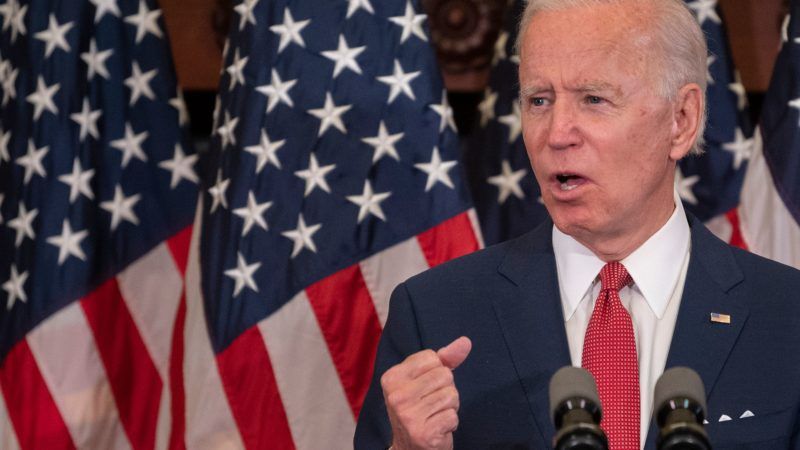Joe Biden's COVID Response Plan: More Money, More Masks, More Testing
Given the current context of the race and the pandemic, Biden's specific plans likely don't matter so much as the impression that he at least has a plan.

With the number of reported coronavirus cases surging in many parts of the country, former vice president Joe Biden took the opportunity on Tuesday to wag his own plans for dealing with the deadly pandemic—even though the plans themselves are mostly secondary.
Biden wants all Americans to wear face masks in public, have access to more testing, and get additional aid from the federal government if they cannot return to work for an extended period of time. Those and other ideas that the presumptive Democratic presidential nominee outlined are things that his campaign has been floating since March. But the real purpose of Tuesday's speech from Wilmington, Delaware, was to draw a distinction between how a potential Biden administration would cope with the pandemic and how the Trump administration has handled it so far—and at a time when polls show most Americans disapprove of the current president's handling of the crisis.
"Infections are on the rise. The threat of massive spikes that could overwhelm the health care system are on the horizon," Biden said in one part of the speech addressed directly to Trump. "Mr. President, the crisis is real and it is surging. Promises and predictions and wishful thinking are doing the country no good."
Biden has the high ground largely because he doesn't have to put any of his plans to the test. Would a temporary $200-per-month boost to Social Security payments actually help Americans respond to the COVID-19 pandemic, or merely worsen the wealth imbalance created and maintained by entitlement programs? Would putting the federal government in charge of telling states when they can reopen parts of their economies prove more effective than the plans states have implemented on their own, or would it do even more damage than the lockdowns have already caused? Biden says he would sign an executive order to force all Americans to wear masks in public, but the enforcement of such a measure would still depend on local authorities—and, ultimately, on individuals, since the government can't possibly police something like that.
In other realms, Biden has the advantage simply because of how poorly Trump has responded to the first major crisis of his presidency. After first downplaying the seriousness of the pandemic and then spending weeks touting unfounded potential cures, the president has pushed responsibility to state leaders, has called for less testing to be done, and has held indoor campaign rallies in defiance of the advice of public health experts.
"Americans social distanced and did their part to bend the curve, but Trump didn't lead," Biden said Tuesday.
Given the current context of the race and the pandemic, Biden's specific plans likely don't matter so much as the impression that he at least has a plan.
In more normal circumstances, there would be an opportunity for Republicans and others to challenge Biden's plan to hire at least 100,000 federal workers to do testing and tracing, for example, particularly in light of the fact that Congress has already inflated the deficit to record highs. Putting the Occupational Safety and Health Administration in charge of setting social distancing rules for workplaces (and imposing fines for violations), as Biden is proposing, seems like a massive expansion of federal regulatory powers that would be unlikely to recede when the crisis passes. And Biden's promise to make more aggressive use of the Defense Production Act to force companies to make more masks and other personal protective equipment would be a huge federal intrusion into the market without any clear indication that it would help.
But given Trump's myriad failures and short attention span for substantive policy discussions, Biden's throw-everything-at-the-wall approach seems to make political sense. Near the end of his address on Tuesday, Biden promised to eventually release a more specific plan for what he would do to combat the coronavirus starting "the day after the election is decided." That's the plan that will matter—the one that will be rooted in the reality of the pandemic's advance, the country's fiscal standing, and the economy's ability to weather the next few months.
For now, Biden just has to look more competent than the guy who spent last weekend carelessly mashing the retweet button.


Show Comments (153)